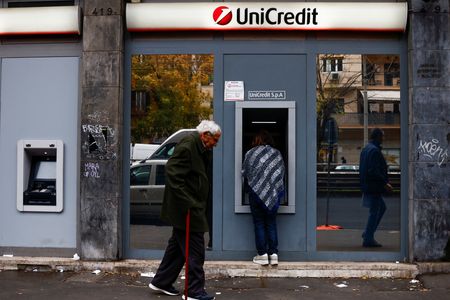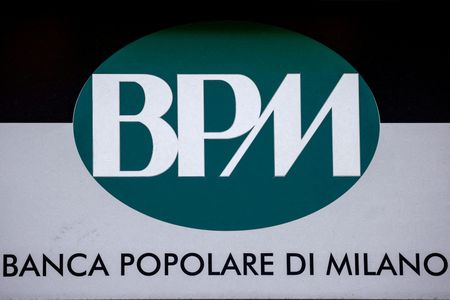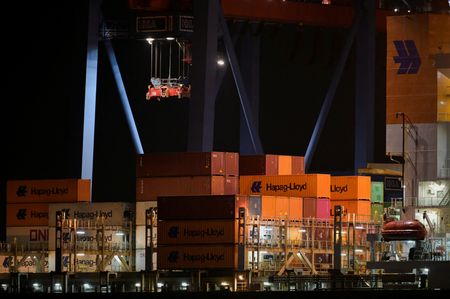By Valentina Za and Tommy Reggiori Wilkes
MILAN/LONDON (Reuters) -Rome’s determination to have a say in the reshaping of Italy’s financial sector has made things increasingly unpredictable for investors who have waited years for consolidation of the country’s fragmented banking landscape.
UniCredit and its CEO Andrea Orcel are locked in a standoff with the Italian government over the bank’s bid for smaller rival Banco BPM.
Italy’s second-largest lender said on Friday it would challenge in court the conditions the government has imposed for its bid to proceed, after securing a 30-day suspension of the offer while it disputes Rome’s demands.
Italy has special powers it can use to protect national security interests but these have become a major hurdle to some of the M&A efforts in the banking sector.
“Things have turned out completely differently than expected,” said David Benamou, chief investment officer at Axiom Alternative Investments, whose European bank fund holds positions in some Italian lenders.
“There are many moving parts and when politics get involved it’s much more difficult to anticipate the drivers.”
Andreas Kokkinis, an associate professor at the University of Birmingham’s law school, who has published work on bank corporate governance, described the conditions Rome has placed on UniCredit’s bid for BPM as “unusual”.
“This is clearly motivated by ‘national interest’ type of concerns and not merely by financial stability or customer protection concerns,” he said, adding that this type of behaviour can harm shareholders as well as economies.
Italian Economy Minister Giancarlo Giorgetti has defended the government’s right to vet banking deals, saying EU states are in charge of national security.
The ministry did not immediately reply to a request for comment.
The government was one of the instigators of the dealmaking flurry, when in November it sold a stake in Monte dei Paschi di Siena. That has since led to seven banking takeover offers in just six months.
POLITICS VS MONEY
Politicians’ desire to influence the make-up of their banking industries – motivated partly by job protection – is playing out elsewhere in Europe too, slowing the consolidation that bank executives and supervisors say is needed.
Germany opposes UniCredit’s ambition to acquire Commerzbank, and the Spanish government is unhappy about BBVA’s bid for domestic peer Sabadell.
Investors see Italy as a testing ground for the merger activity that would help European banks close a profitability and valuation gap with U.S. rivals.
M&A speculation is helping to keep European bank stocks near 17-year highs, though falling interest rates pressure earnings. Shareholders interviewed by Reuters are convinced there is no alternative to reducing the number of players.
“Our playbook here is the United States,” James Davidson, co-manager of the Artemis Global Income Fund, told Reuters.
“The number of U.S. banks has halved in the past 22 years; we expect it to halve again. The biggest U.S. banks have grown market share quickest – leveraging technology & scale.”
Italy’s conservative government has its own view. It has repeatedly said it would use the re-privatisation of MPS, which it rescued in 2017, to create a bigger competitor to market leaders Intesa Sanpaolo and UniCredit.
“It surely looks messy, but the dynamics are quite clear: politics on one side and people trying to make money on the other. A compromise needs to be found,” Benamou said.
OPPORTUNITIES AND RISKS
To promote its agenda, Rome in November sold chunks of MPS to the Del Vecchio and Caltagirone families, who are also major investors in insurer Generali and in its biggest shareholder, merchant bank Mediobanca.
In response, UniCredit’s Orcel has sought to bolster the bank’s leverage, building a 6.7% Generali stake and throwing his weight behind Caltagirone at a key Generali shareholder vote.
Orcel needed allies after UniCredit’s swoop on BPM deprived Italy’s Treasury of its favoured merger partner for MPS, which has since bid for larger rival Mediobanca.
To fend off the MPS takeover, Mediobanca moved on Banca Generali, a private bank owned by Generali. It would finance the deal by handing over its stake in the insurer.
The web of dealmaking is complicated, but for investors the M&A chaos is better than the years of stasis that preceded it.
“Now banking consolidation has struck,” said Andrea Scauri of Lemanik Asset Management. “I see it positively: it carries opportunities. Also risks, if you find yourself on the wrong side of the trade, but that’s for investors to navigate.”
Some, however, worry that the rewards from having fewer banks risk being lost.
“Consolidation aims to strengthen Italy’s banks but governance weaknesses rooted in ownership structures and possible political agendas threaten to undermine its benefits,” said Guy de Blonay, fund manager at London-based Jupiter Asset Management.
(Reporting by Valentina Za in Milan, additional reporting by Sinead Cruise and Iain Withers in London, Giuseppe Fonte in Rome. Editing by Jane Merriman)










